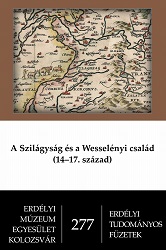Drágfi Bertalan politikai szerepe II. Ulászló király
idején
Bertalan Drágfi’s Political Role in the Time of King Vladislas II
Author(s): Tibor Neumann
Subject(s): Local History / Microhistory
Published by: Erdélyi Múzeum-Egyesület
Summary/Abstract: The study presents the political activity of Bartholomew Drágfi between 1490 and 1501, the year of his death. Following the death of King Matthias, Drágfi joined the widow queen and the group of aristocrats around her, and took part in the defeat of Matthias’s illegitimate son, Prince John Corvinus, in the battle of Csontmező. Thanks to this, Vladislas II, elected King of Hungary (1490–1516), following his coronation in September appointed him Master of chamberlains (magister cubiculariorum), then later Ispán of Chamber (comes camararum) of Baia Mare (Nagybánya). The author presents the events that happened in the beginning of 1493, which led to the appointment of Drágfi and magister tavernicorum regalium Ladislaus Losonczi as Voivodes of Transylvania. Drágfi and Losonczi were voivodes together for one year and a half, but they only resided in their province in times of war. Soon serious conflicts started between the two voivodes and the groups formed around them, for which reason Vladislas II – who visited Transylvania for the first and last time – dismissed Losonczi in Sibiu (Nagyszeben) in September 1494. Drágfi, who was now alone Voivode of Transylvania, became the country’s most powerful politician and military baron until his dismissal in 1498. At the turn of 1494–1495, he was also in charge of the campaign against Duke Laurence Újlaki in the southern territories, and as voivode, he took part in several military actions, for example he was leader of the campaign initiated to help Moldova in 1497. The study presents the sources which led to Drágfi’s dismissal and resignation. The precise reason of this is as yet unknown, but Drágfi had serious disagreements with the estates of Transylvania as early as 1496. The author analyzes the period of double voivodate, Drágfi’s activity as a voivode, presents his marriages and his land acquisition strategy involved. Drágfi died on 26 October 1501, and it was because of his activity in the Jagellonian age that Vladislas II appointed Drágfi’s sons permanent barons in 1507, and both he and his son, Louis II, granted them several baronial and territorial offices.
Book: A Szilágyság és a Wesselényi család (14–17. század)
- Page Range: 213-236
- Page Count: 23
- Publication Year: 2012
- Language: Hungarian
- Content File-PDF

